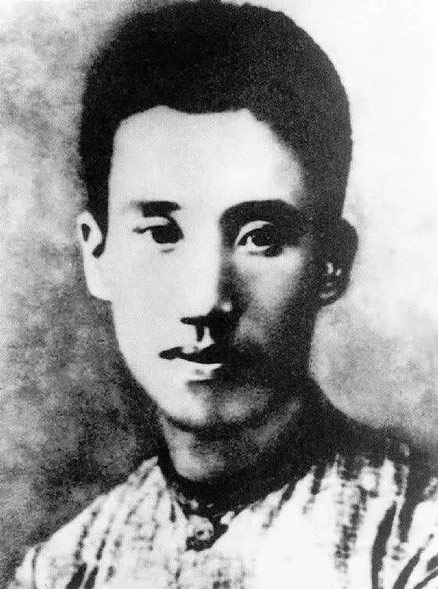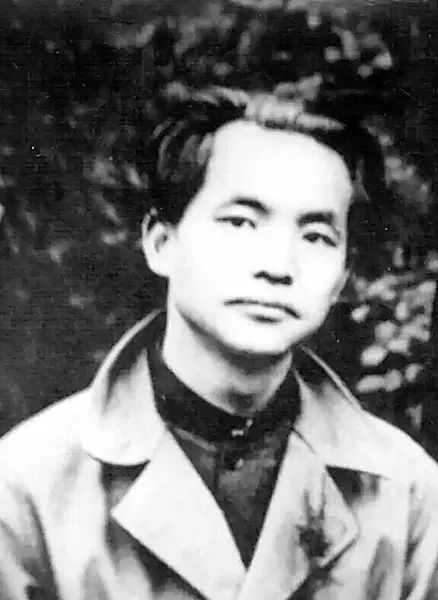Party building column
Do not forget the original intention and keep the mission in mind
1921-2021
The 100th Anniversary of the Communist Party of China
The great river goes east, the waves are exhausted, and the romantic figures of the ages. In the starry sky of history, countless geniuses and heroes, like bright stars, radiate dazzling rays of light, illuminating the way forward in human history. They fought bloody battles, they were loyal and brave, or they were poetic and poetic, and they were laughing and laughing; some great people said that those who are romantic and romantic, also look at the present. So today, let us talk about the romantic figures of ancient and modern times, and relive the great influence and brilliant achievements they have brought us.
Surge:
Pioneer of Chinese Peasant Revolutionary Movement
Warmly celebrate the 100th anniversary of the founding of the Communist Party of China

Peng Pai, a proletarian revolutionary of the older generation of the Communist Party of China, a pioneer of the Chinese peasant revolutionary movement, and the founder of the famous Hailufeng Soviet regime. In October 1896, Peng Pai was born in Haifeng County, Guangdong Province. He went to Japan to study in his early years and returned to China in 1921. He founded the Socialist Research Society and the Workers' Sympathy Society in Haifeng to spread Marxism.
Peng Pai came from a wealthy background, but he was close to the peasants. The reality of the desolate countryside and the poverty of the peasants once made the young Peng Pai deeply understand the decay and suffering of the old society. In 1922, Peng Pai walked into the countryside alone, learned about the suffering of farmers, organized farmers, and launched farmers' movements. The book "Haifeng Peasant Movement" written by him has become a must-read for those engaged in the peasant movement, and he is also known as the "King of the Peasant Movement".
"Grandpa once said, 'What is a revolution? A revolution must fight for the interests of the majority, and we must advocate the interests of the majority if we want a revolution.' Where were most people in China at that time? Most people were farmers. Our party We must fight for their rights and interests," said Peng Yina, the granddaughter of Martyr Peng Pai.
In July 1922, six people including Peng Pai and Zhang Maan established Hailufeng's first peasant association, the "six-person peasant association", which ignited the peasant movement. In January, it expanded to 10 counties including Lufeng and Huiyang, and Peng Pai successively established Huizhou Farmers' Federation and Guangdong Farmers' Association.
In April 1924, Peng Pai went to Guangzhou to lead the peasant movement and founded the peasant movement workshop. He was the director and key teacher of the first and fifth agricultural workshops.
In early March 1925, Peng Pai organized the establishment of the Haifeng branch of the Communist Party of China and served as the secretary.
In March 1927, he went to Wuhan, where Peng Pai and Mao Zedong initiated the organization of the temporary executive committee of the All-China Farmers Association, and served as executive member and secretary-general.
After the failure of the Great Revolution, Peng Pai went to Nanchang to lead the Nanchang Uprising. The 87th meeting of the party elected the interim Political Bureau of the Central Committee. He was elected as a member of the Political Bureau, and later served as a member of the Southern Bureau of the Central Committee of the Communist Party of China. At the end of October, he returned to Hailufeng and instigated an armed uprising.
In November 1927, Peng Pai led the establishment of the Hailufeng Soviet regime. In November 1928, Peng Pai was elected as a member of the Political Bureau of the CPC Central Committee, and served as secretary of the Central Agricultural Committee of the Communist Party of China, member of the Central Military Commission of the Communist Party of China, and secretary of the Military Commission of the Jiangsu Provincial Committee of the Communist Party of China.
In August 1929, Peng Pai was arrested for betrayal by a traitor and was detained in Shanghai Longhua Prison. In prison, he was unyielding and fought bravely. He said: "As long as I have one breath left, I will fight to the end for the cause of communism!" On August 30 of that year, Peng Pai and his comrades-in-arms Yang Yin, Yan Changyi, and Xing Shizhen sang "The Internationale", shouting "Down with imperialism." "Long live the Chinese Red Army!" "Long live the Chinese Communist Party!" and other slogans died heroically at the age of 33.
Deng Zhongxia:
The final victory is ours
Warmly celebrate the 100th anniversary of the founding of the Communist Party of China

Deng Zhongxia (1894-1933) was an alternate member of the Political Bureau of the CPC Central Committee, director of the Secretary Department of the Chinese Labor Combination, and political commissar of the Second Red Army.
A native of Yizhang County, Hunan Province, born in October 1894 in Dengjiawan Village, Taipingli Township, Yizhang County. In 1915, he was admitted to the Chinese Department of Hunan Higher Normal University. In 1917, he was admitted to the Department of Chinese Language and Literature of Peking University. After 1918, under the influence of the Russian October Revolution and the inspiration and education of Li Dazhao, the founder of the Chinese Communist Party, he began to accept Marxism, participated in a series of revolutionary activities during the May Fourth period, and became a representative of revolutionary youth.
In March 1920, he participated in the organization of the Marx Theory Research Association. After graduating from Peking University, he gave up the excellent job position his father had sought for him and the opportunity to go abroad at public expense. Under the advocacy of Li Dazhao, he participated in the establishment of the Beijing Communist Group and was one of the leaders. Actively assisting Li Dazhao's work, he founded the workers' newspaper "Labor" and Changxindian workers' night school, labor tutoring school and workers' club, and promoted anti-feudal revolutionary ideas to the workers, and trained many working backbones. He is one of the founders of the Beijing Communist Group. He was elected as a representative and participated in the drafting of relevant documents for the party's major conference. He was busy with the work of the Youth China Society and did not attend the party's first major conference. In 1922, he participated in the first national labor conference, and later served as the director of the secretary department of the Chinese labor union. He was elected as a member of the Central Committee at the second party congress. Participated in and led the Changxindian, Jinghan Railway, Kailuan Coal Mine, Shanghai Spinning Factory, Shanghai Seafarer University - and the provincial and Hong Kong University that shocked China and foreign countries - was an early leader of China and a party theoretician for the development of the Chinese revolution and labor movement made an outstanding contribution.
After the failure of the 27th National Congress in 1923, according to the arrangement of the party organization, he served as the president of Shanghai University and presided over the administrative work of the school. During this period, he conducted theoretical reflections and wrote articles advocating the leadership of the revolution by the proletariat, such as "The Three Masses of the Revolution", "On the Labor Movement", "On Agriculture-Movement", "Our Strength", etc. The economic status and political attitudes of all social classes have been scientifically analyzed, and the nature, tasks, driving forces, and policies of the Chinese revolution have been systematically expounded, which has laid a theoretical foundation for the Party's four major issues of leadership, and is therefore well received by the Party. The Central Committee attaches great importance to him, and was elected as a member of the Central Committee in the three and four major parties of the party. The development of revolutionary practice proved his views to be correct. The May 30th Movement in 1925 and the struggle between the Provincial and Hong Kong University were inseparable from his correct theoretical and strategic guidance and in-depth organization and mobilization. Written in 1927, the article "1926 Workers' Movement in Guangzhou" summed up the struggle experience of the province and Hong Kong, and raised the issue of establishing a democratic political power united by workers, peasants and petty bourgeoisie in the democratic revolution.
In April 1927, he continued to be elected as a member of the Central Committee at the Fifth Congress of the Communist Party of China and served as Secretary-General of the Central Committee. Chiang Kai-shek - after the coup d'état, he and Li Lisan proposed the Nanchang Uprising, which was countered by revolutionary means - and advocated armed struggle and agrarian revolution. He was elected as an alternate member of the Political Bureau of the CPC Central Committee at the 87th meeting of the Party, and served as the secretary of the Jiangsu Provincial Party Committee, responsible for the restoration and reconstruction of the Shanghai Party organization. In February 1928, he went to Hong Kong to replace Li Lisan as the secretary of the Guangdong Provincial Party Committee. In April, he represented the All-China Federation of Trade Unions in Moscow to attend the Fourth Congress of the Red Workers International. He was elected as the Central Executive Committee of the Red Workers International. Sixth Congress and the Sixth Congress of the Comintern.
Returning from the Soviet Union in July 1930, he served as secretary of the Special Committee of the Western Soviet Area of Hunan and Hubei, political commissar of the Second Red Army and secretary of the former enemy committee. He led the local armed struggle together with He Long and Zhou Yiqun, and also carried out the "Left" orders of the central government against his will. made some mistakes. Soon after Wang Ming came to power, they retaliated against him, revoked all his posts and stopped working. It was not until the autumn of 1932 that he was arranged to be the director and secretary of the party group of the China Red Mutual Aid Association. He took the overall situation into consideration, regardless of personal gains and losses, went deep into the masses, contacted people from all walks of life who supported the revolution, and quickly opened up the work situation. After his unfortunate arrest in March 1933, Chiang Kai-shek immediately ordered him to be escorted to Nanjing -. Regardless of the enemy's conspiracies and tricks, he was always steadfast and unyielding, and said with awe-inspiring righteousness: "There is no bloodless revolution in ancient and modern China and abroad. To sacrifice for the revolution is to be immortal." "It is to burn Deng Zhongxia's bones to ashes, Deng Zhongxia He was still a member of the Communist Party." In the early morning of September 21, 1933, the enemy who had nothing to gain killed him at Yuhuatai, Nanjing, at the age of 39.

Guanghe crab rice home
WeChat | ghxiedaojia
This is a public account with a soul